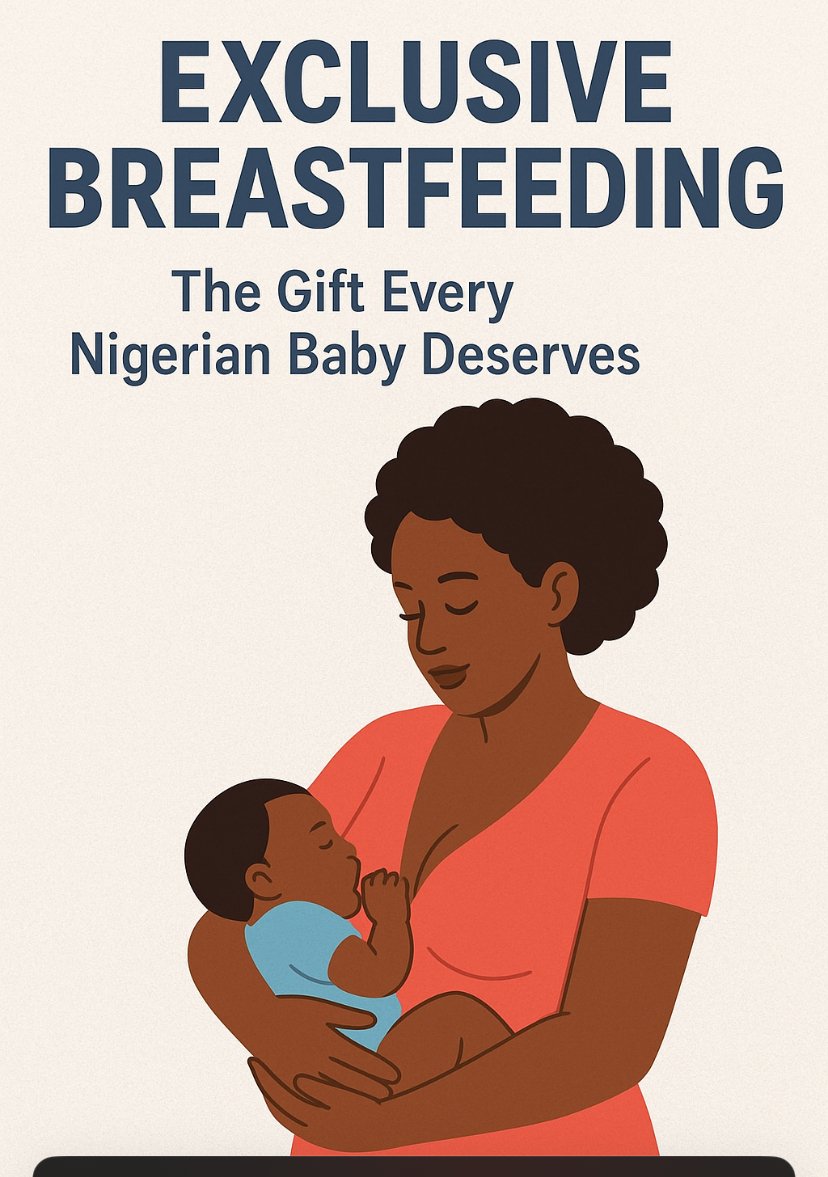Exclusive Breastfeeding: The Gift Every Nigerian Baby Deserves

By Editorial Team
Exclusive breastfeeding for the first six months of life is one of the greatest gifts a mother can give to her child and it has has been proven to be the foundation of lifelong health for children.
Yet, in today’s society, a disturbing trend is emerging. Many new mothers are refusing to breastfeed exclusively because they fear sagging breasts or losing their body shape.
This obsession with appearance is costing babies the nutrients they need to survive, grow and develop strong immunity. It is a selfish choice with lifelong consequences. While mothers protect their looks, babies are left vulnerable to infections, diseases and stunted growth.
The Miracle of Mother’s Milk
Global health bodies such as the World Health Organization and UNICEF have repeatedly emphasized that exclusive breastfeeding for the first six months offers unmatched benefits.
Breast milk is not just food, it is medicine, protection and love combined in one. It contains the exact balance of vitamins, proteins, carbohydrates, and fats a baby needs. It strengthens the immune system by providing antibodies that fight off infections.
Unlike baby formulas, breast milk changes naturally as the baby grows, adjusting to meet every stage of development. It is perfectly designed by nature and no factory product can match it.
Protecting Babies Against Killer Diseases
The benefits of exclusive breastfeeding go far beyond nutrition. Babies who are exclusively breastfed have a much lower risk of infections such as diarrhoea, ear infections, pneumonia, eczema, leukaemia, whooping cough, and even sudden infant death syndrome (SIDS).
Research also shows that breastfeeding reduces the chances of children developing long-term diseases like diabetes, asthma, and obesity. In a country like Nigeria where access to healthcare is often limited, exclusive breastfeeding is one of the most powerful weapons a mother can give her child for survival.
Breastfeeding Protects Mothers Too
Exclusive breastfeeding is not just good for babies; it is also beneficial for mothers. One of the strongest myths is that breastfeeding ruins a woman’s body. On the contrary, breastfeeding helps mothers lose pregnancy weight faster by burning extra calories naturally.
It also triggers the release of oxytocin, which contracts the uterus and helps it return to its pre-pregnancy size. This reduces the risk of excessive bleeding and supports faster recovery.
Also, breastfeeding lowers a mother’s risk of developing serious diseases such as osteoporosis, thyroid problems, breast cancer, and ovarian cancer.
Mothers who choose not to breastfeed are not only denying their babies health benefits, they are also harming themselves.
Bonding Between Mother and Child
Beyond nutrition and health, exclusive breastfeeding creates an emotional bond between mother and child. The skin-to-skin contact and eye-to-eye connection build trust, comfort and love that no substitute can replicate.
Psychologists argue that this early bond fosters better behavioural development in children. Babies who are breastfed are more likely to feel secure, sleep better and develop healthier social connections later in life.
By not breastfeeding, many mothers are weakening this natural bond and denying themselves the joy of deep connection with their babies.l
The Economic Wisdom of Breastfeeding
At a time when inflation is crippling many Nigerian households, exclusive breastfeeding is also the most economical choice.
Families struggling with the rising cost of food and healthcare should see breast milk as a free, natural, and readily available option that is not affected by market price hikes.
Breast milk does not require sterilization, mixing, or purchase. It is safe, clean, and always the right temperature. By breastfeeding exclusively, mothers protect their children while also shielding their families from unnecessary financial stress.
Fathers and Families Support
Another overlooked factor is the role of fathers. Many men fail to support their wives during breastfeeding, sometimes even encouraging formula feeding for convenience. Fathers must understand that exclusive breastfeeding is an investment in their child’s future.
Fathers supporting mothers emotionally and physically make it easier for women to breastfeed successfully.
Grandmothers and extended families must also stop pushing outdated practices that replace breast milk with water, pap, or herbal mixtures before six months. Exclusive means exclusive, no water, no juice, no formula, only breast milk.
Society’s Role in Encouraging Breastfeeding
This crisis is not just about individual choices. Society itself has failed to promote breastfeeding strongly enough. Social media influencers flaunt body shapes and lifestyles that make young mothers feel pressured to “snap back” after childbirth.
Hospitals and health workers need to double their efforts in counselling mothers about the truth of breastfeeding. Communities, religious institutions and the media must also promote the message that a mother’s first duty is to the health of her child, not her looks.
Nigeria as a nation must act. Government should intensify campaigns on breastfeeding, regulate misleading formula adverts and extend maternity leave so women can feed their babies without pressure. Workplaces should also provide breastfeeding-friendly spaces for mothers.
Public shaming of women breastfeeding outside the home must also stop. Instead, mothers should be celebrated for choosing the most natural and selfless act of nurturing life.
Breastfeeding is not just about nutrition, it is about survival. Healthy children grow into strong adults who build society, while sickly children become a burden on families and the economy. By avoiding exclusive breastfeeding for vanity reasons, mothers are weakening not only their families but also the nation’s future.
Exclusive breastfeeding is free, natural and irreplaceable. Beauty fades, but the health and life of a child last forever. Nigerian mothers must rethink their choices and put their babies first.







